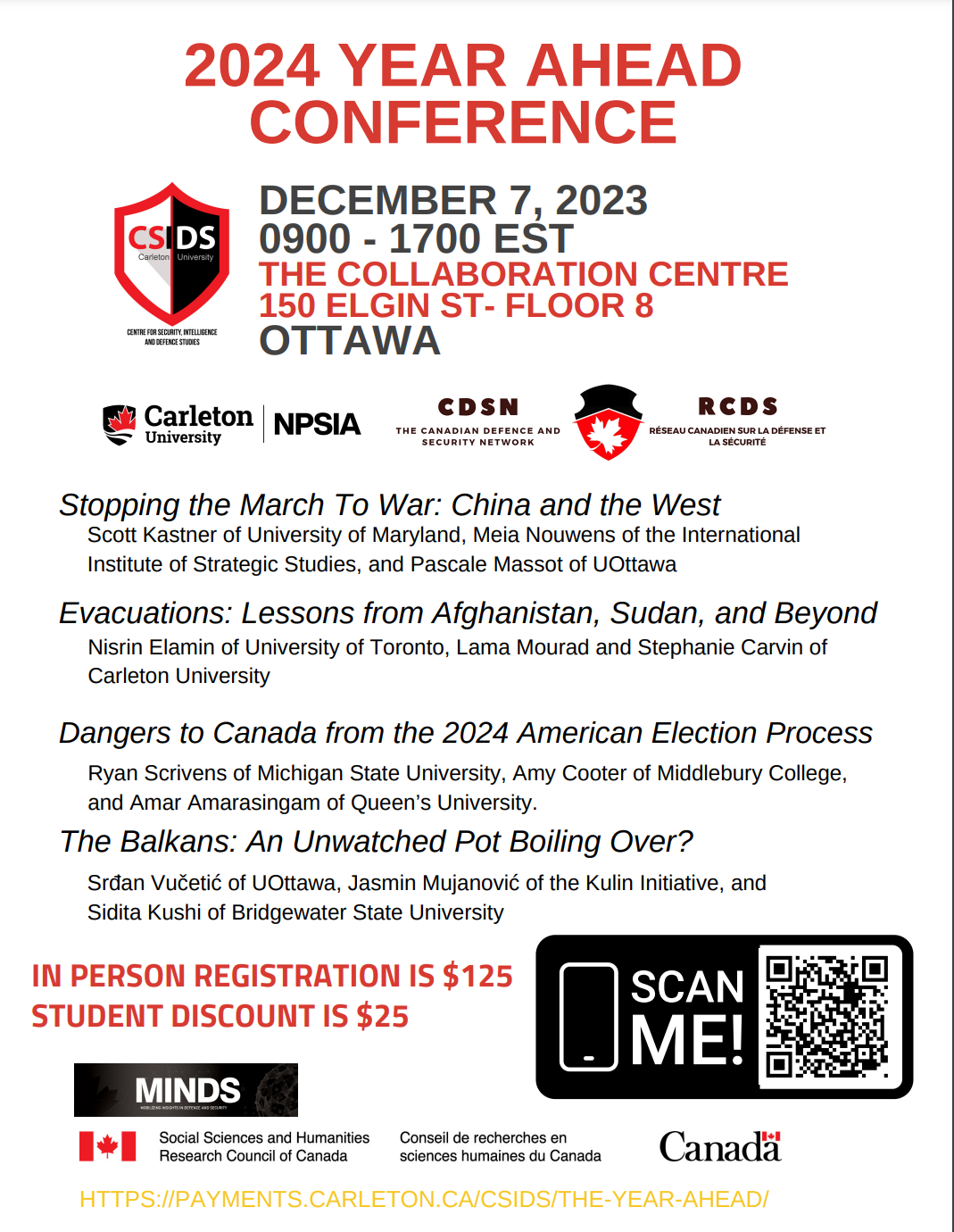The book launch had triple the number of people we planned for--150 or so. We ran out of drink tickets before the speakers event started. I got a chance to say a few words, mostly to tease Phil and Thomas, partly to promote the Year Ahead event. It might have been the free booze or it might have been the appearance of the CDS that drew the crowd. General Wayne Eyre stuck around after his talk for a good 1.5 hours to have pictures taken and to chat with the group. In my intro, I mentioned that most folks think that no one in Canada cares about Defence, so I guess everyone who does was at the event.
I really enjoyed the event--glad to see Thomas and Phil and their contributors get the spotlight, great to chat with former students, officers and officials who have interacted with me online but not in person, and various other folks. I spent many of my conversations promoting our big event the next day.
The Year Ahead started before the CDSN, with Rob McRae as the director of our research center--CSIDS--building a conference aimed at considering the potential challenges facing us in the near future--the year ahead. We took this over, and it has gone through various changes over the years due to pandemics and such. This year, we moved to a different space, the former Shopify offices, which meant we could go down a slide and play with giant versions of Connect 4 and Jenga.
We consulted our various partners in and out of government and came up with four topics.
In our first session (no pics since I was the moderator), we had Scott Kastner zoom in and Meia Nouwens and Pascale Massot in person discuss the challenge of addressing an aggressive China whilst avoiding war. The good news is that China is not ready for a Taiwan invasion, so the much feared war is not as likely to happen very soon. On the other hand, various policies to deal with China are problematic--like "derisking" by trying to avoid China in various supply chains is simply not going to work well.
In the second session, we had very different talks as Nisrin Elamin presented her experience as she was in Sudan when the coup attempt/civil war started, and had a hard time getting herself, her kid, and her parents out of the country. Stephanie Carvin presented her comparative project (with the aforementioned Thomas Juneau) about how democracies take care of their people in conflict situations, Duty of Care, to help us understand the government side. It was an excellent conversation to see the personal dynamics interact with the policy challenge.
We broke for lunch and made much use of this great space especially the students from Carleton and the NATO Field School:
The third session considered whether and how the 2024 election would generate extremism and violence not just in the US but in Canada. They made it pretty clear that, yes, there will be more extremist violence generated by the
As a political scientist, I ordinarily would not support this appeal that Amar made:
Our last panel was certainly not least as Srdjan Vučetić, Jasmin Mujanović, and Sidita Kushi passionately and insightfully presented the latest dynamics in the Balkans. I used to study the international relations of some of this so I was surprised to learn how badly the US is screwing this up by supporting directly or indirectly Serb nationalists who are preventing Kosovo from moving forward. That five European
countries don't recognize Kosovo doesn't surprise me as these folks haven't read my earlier work--that secession is not as contagious as thought, that recognition in place does not really matter elsewhere, etc. It was a great panel to end the day, since the speakers were very dynamic in their criticism of US and European policy in the region. To put a Hungarian in charge of the NATO forces in the region is just dumb from so many dimensions--Hungary is a spoiler, its military was one of the worst performers in Afghanistan (the nearby New Zealanders would patrol in the Hungarian sector since the Hungarians didn't patrol)., and so on.
Oh and it turns out the metaphor I used to describe this panel was a bit ... dated and unoriginal and problematic:
We concluded and moved on to a delightful dinner. So glad I had a chance to meet these folks. And I am very proud of the CDSN HQ folks--Melissa, Sherry, Racheal, and Mourad--for doing all of the heavy lifting (sometimes quite literally as our swag was in big boxes). Much thanks to the MINDS and SSHRC folks who fund us and to the NATO Field School and the new Carleton Society on Conflict and Security (I am surely getting their name wrong)--a new student group on campus for those interested in defence and security stuff--for providing much of our audience.
Oh, and one last thing:
While others did go down the slide, I didn't manage to squeeze it in.
%20Thomas%20Juneau%20on%20X%20Book%20launch!!%20If%20you%20are%20in%20Ottawa%20Philippe%20Lagass%C3%A9%20and%20I%20are%20inviting%20you%20to%20the%20launch%20of%20our%20new%20book%20Canadian%20Defence%20Policy%20in%20Theory%20and%20Practice%20vol.%20%5B...%5D.png)

.png?format=1500w)










No comments:
Post a Comment